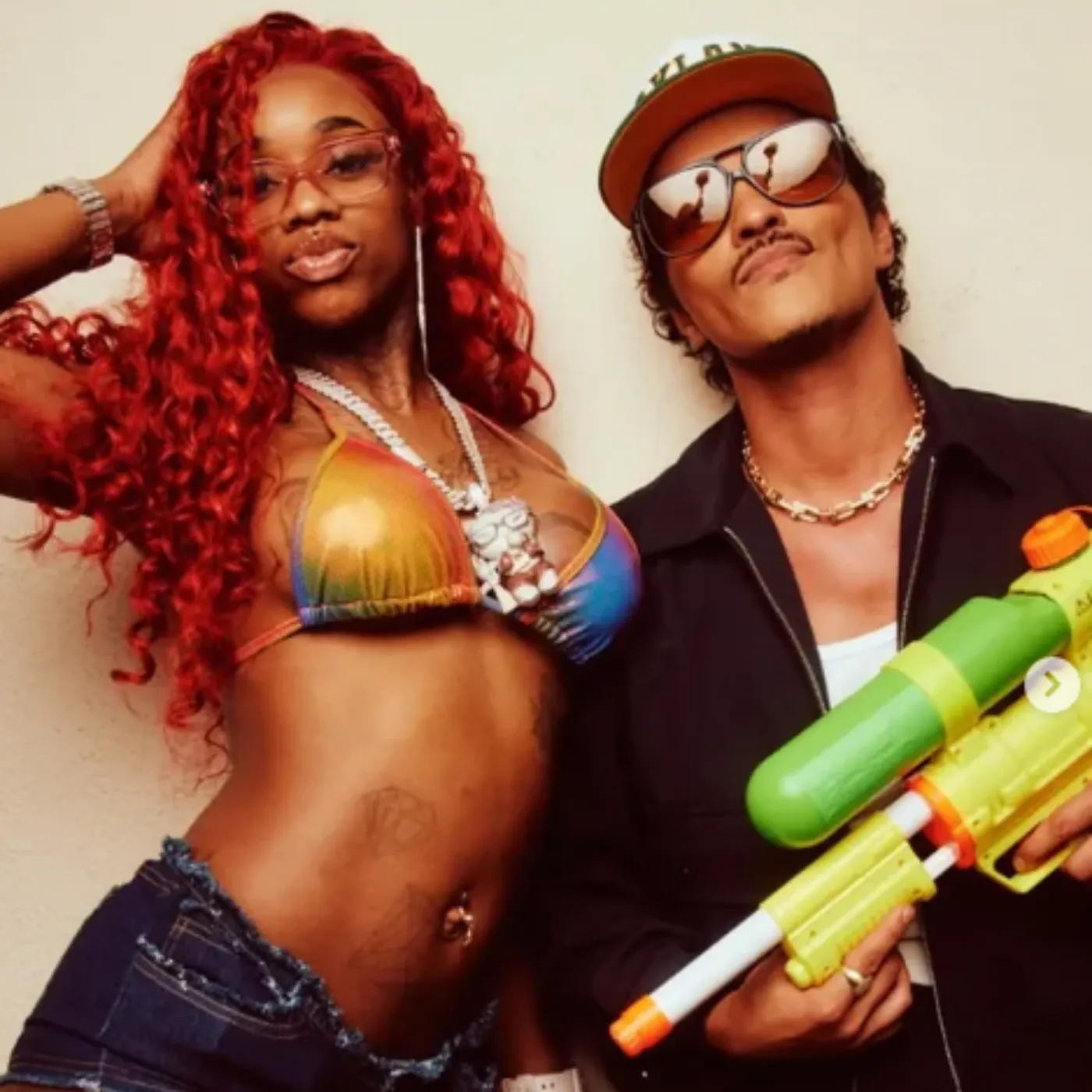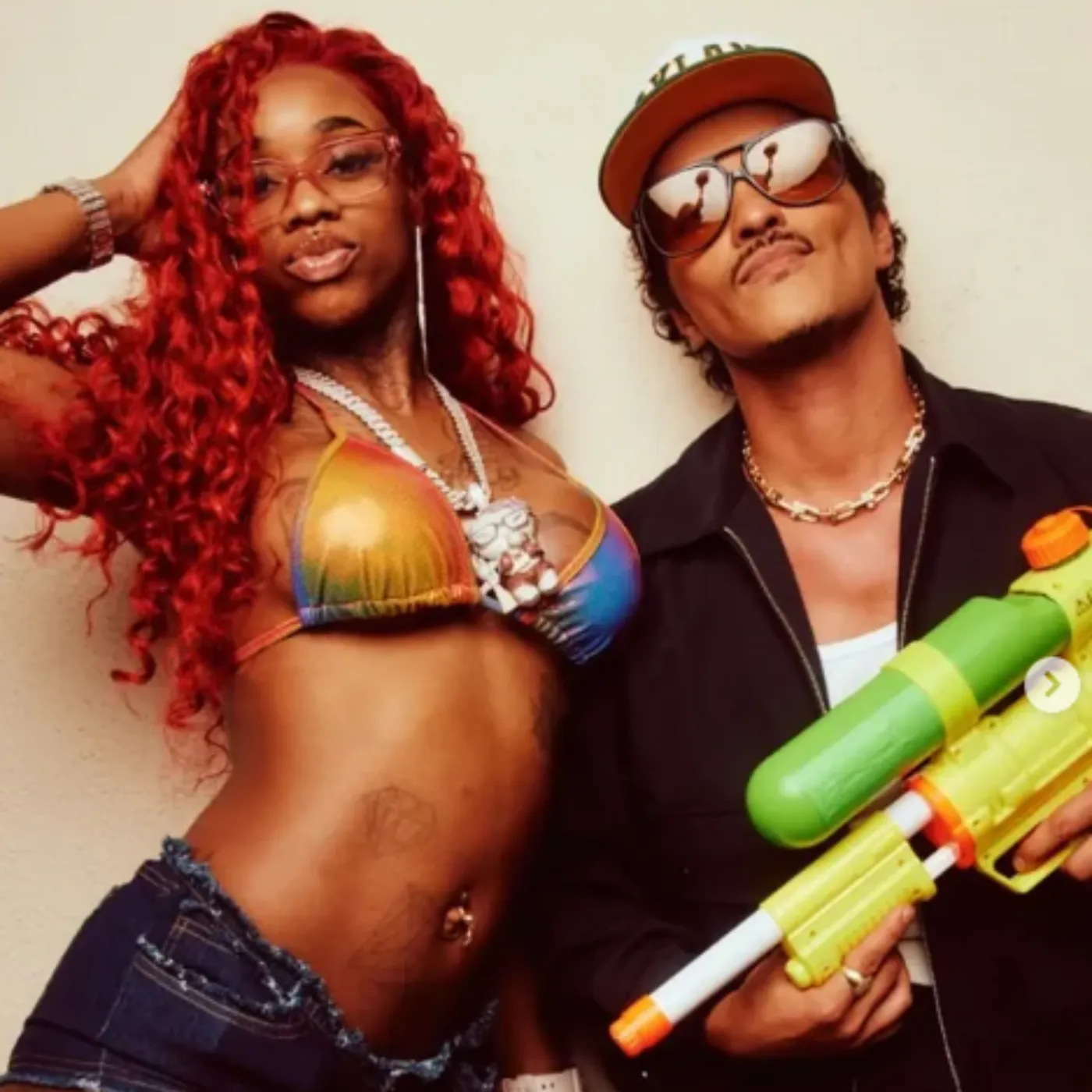

Joe Budden Says Bruno Mars and Sexyy Red’s Careers Are About to Crash Because of This
In the ever-changing world of hip-hop and pop music, few collaborations stir the pot like the one between Bruno Mars and Sexyy Red. With Bruno Mars’ signature smooth, retro sound and Sexyy Red’s distinct, unapologetic style, it’s a pairing that many fans never saw coming. But when renowned podcaster and rapper Joe Budden recently weighed in on their collaboration, he didn’t hold back—calling the project “whitewashed” and accusing Sexyy Red of “selling out” by changing her style for the collaboration. His controversial remarks sent shockwaves through the music world, igniting a heated debate about cultural authenticity and the commercialization of Black music.

Joe Budden’s Burning Critique
Joe Budden’s critique of the collab was nothing short of incendiary. Speaking on his podcast, Budden described the track as a “costume,” implying that the collaboration between Bruno Mars and Sexyy Red was little more than a gimmick. “It’s like putting on a costume,” he said. “You’re dressing up as something you’re not, trying to fit into a mold that just doesn’t reflect who you are.”
His words were pointed, accusing the two artists of pandering to mainstream audiences while sacrificing their authenticity. Budden wasn’t just critical of the musical style—he took aim at the business side of things, claiming that such collaborations were “force-feeding ghetto bullsh*t to Black people” for the sake of profit.
It’s clear that Budden’s issue wasn’t with the music itself, but with the perception that certain artists were altering their style to suit a larger, whiter, more commercial market. Bruno Mars, with his penchant for 70s funk and soul, has been criticized in the past for what some fans perceive as an appropriation of Black music. But in this case, Budden is specifically calling out the dynamics at play when artists from different genres or backgrounds blend their sounds—especially when it feels like a strategic move to cash in on current trends.
Sexyy Red: From Gritty to Glamorous?
For many, the controversy surrounding the collaboration between Mars and Sexyy Red goes beyond just the song—it’s about the perceived change in Sexyy Red’s style. The rapper, known for her bold, no-holds-barred lyricism, made waves in the rap scene with her unapologetic approach to both her sound and image. But after teaming up with Bruno Mars, her sound seemed to shift, much to the chagrin of some critics.
While she had become known for her brash lyrics and streetwise persona, the collaboration with Mars saw her adopting a more polished and radio-friendly style. Fans of her earlier work began to feel that her essence had been diluted. It was as though she traded in her roots for a glossier, more commercial sound—a move that many thought was influenced by the desire to work with a mainstream pop star like Bruno Mars.
But what happened next was even more perplexing: Sexyy Red released a new single where she completely reverted to her previous style. The track was raw, unfiltered, and unapologetically “ghetto,” just like her fans had come to expect. It’s clear that she had no interest in staying in the “whitewashed” lane that some had tried to put her in.

The Bigger Picture: Is Authenticity in Music Overrated?
At the heart of this critique is a much larger question: what does it mean to be authentic in the music industry? For years, there has been a debate about whether artists like Bruno Mars, who draw inspiration from a variety of genres and cultures, are crossing a line into appropriation. Some argue that Mars has the right to express himself in whatever way he chooses, while others feel that his career has been built on borrowing heavily from Black music traditions.
On the other hand, critics like Joe Budden suggest that artists like Sexyy Red are under pressure to conform to mainstream ideals and compromise their authenticity. In Budden’s view, it’s not just about music—it’s about how the industry as a whole tends to commercialize culture for profit, often stripping away the very thing that made the music meaningful in the first place.
But is this critique fair? Are artists like Bruno Mars and Sexyy Red simply evolving, or are they being forced into a box that’s dictated by the music industry’s desire to commodify Black culture? The answer isn’t simple. Music is a business, and in that business, the line between artistic expression and commercial success is often blurred. What may seem like a creative evolution to some might feel like a sellout to others.
Sexyy Red and Bruno Mars: Two Sides of the Same Coin?
It’s important to remember that both Sexyy Red and Bruno Mars come from different musical worlds. Bruno Mars, with his ability to cross genres—from pop to funk to soul—has become a commercial powerhouse in the mainstream music industry. But Sexyy Red, who represents a much grittier, street-level sound, has carved her own niche by speaking directly to her audience with raw, unapologetic lyrics. When the two collaborate, it’s a clash of styles and cultures that, according to some, shouldn’t exist in the first place.
Yet, both are undeniably talented and have shaped the soundscape in their respective genres. But this collaboration reveals the tension between staying true to one’s roots while also achieving success on a larger scale. Bruno Mars’ style may have once been seen as an homage to Black music, but now it’s under scrutiny as potentially part of a larger “gentrification” of music—a trend where traditionally Black sounds are sanitized and resold to a mainstream audience.
This is where the metaphor comes in—it’s like trying to wear shoes that don’t quite fit. When artists like Mars or Red change their styles or collaborate with mainstream figures, it sometimes feels like they are slipping on shoes that don’t belong to them, trying to appease a larger audience instead of staying true to the streets and cultures that shaped their sound. And when they take those shoes off and go back to their roots, it’s as though they’re putting on their real sneakers again—comfortable, familiar, and uniquely theirs.
Is Joe Budden right?
The real question here is, is Joe Budden right in his critique? While his words may seem harsh, they resonate with many who feel that the commodification of Black music has gone too far. In some ways, the critique brings attention to the systematic pressures artists face to adapt their sound to what’s marketable rather than what’s real.
But then again, the music industry isn’t just about staying true to one’s origins—it’s about growth, change, and finding new ways to express creativity. Both Bruno Mars and Sexyy Red are incredibly talented artists who have earned their place in the spotlight. Whether or not their collaboration is seen as “whitewashed,” it’s clear that their careers are built on hard work, talent, and a willingness to push boundaries.
In the end, the world of music will continue to evolve, and so will the debate about authenticity, cultural appropriation, and the pressures to conform. But one thing is certain: no matter how many costumes you wear or shoes you try on, the music will always speak for itself.
Bruno Mars: A Pop Icon in Question?
Bruno Mars has long been a staple in pop music, known for his impeccable vocal ability, catchy tunes, and genre-blending sound. He has built an entire career out of drawing on the sounds of past decades—particularly from the Black musical traditions of the 70s and 80s. However, Mars has never been without his critics. Many question whether his style, which often features elements of funk, soul, and R&B, is truly authentic or if it’s just a product of his desire to craft a “retro” sound that appeals to mainstream, predominantly white audiences.
But can we really fault Mars for doing what every artist in history has done—experimenting with different sounds and creating a style all their own? Music has always been a melting pot of influences, and artists like Mars are, in many ways, merely reflecting that. The problem comes when that experimentation begins to feel like appropriation—when Black music becomes a trend for the masses, stripped of its cultural context and repackaged for a different audience.
Yet, Bruno Mars has managed to maintain a unique position in the music industry, thriving on his versatility and his ability to blend styles in a way that resonates with fans of all backgrounds. His collaboration with Sexyy Red, then, serves as a reminder of how complicated the line between commercial success and cultural appropriation can be.

The Takeaway: Evolution vs. Tradition in Music
Ultimately, the collaboration between Bruno Mars and Sexyy Red forces us to confront difficult questions about authenticity, creativity, and cultural preservation in music. Is it possible for an artist to evolve and still maintain their authenticity? Can commercial success coexist with cultural integrity? And, perhaps most importantly, how do we balance artistic expression with the desire to be accepted by a larger audience?
Joe Budden’s critique raises these questions in a way that demands attention. Whether you agree with his stance or not, it’s clear that these issues will continue to shape the future of music and the way we view collaborations, authenticity, and cultural representation.
Music, at its core, is about storytelling—about expressing emotions, experiences, and identities. As the industry evolves and new trends emerge, one thing remains certain: the conversation about who gets to tell those stories, and how, is far from over.


















